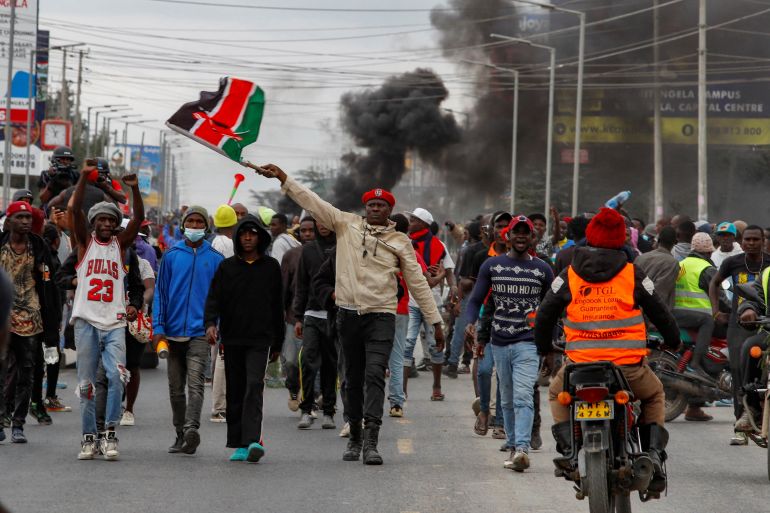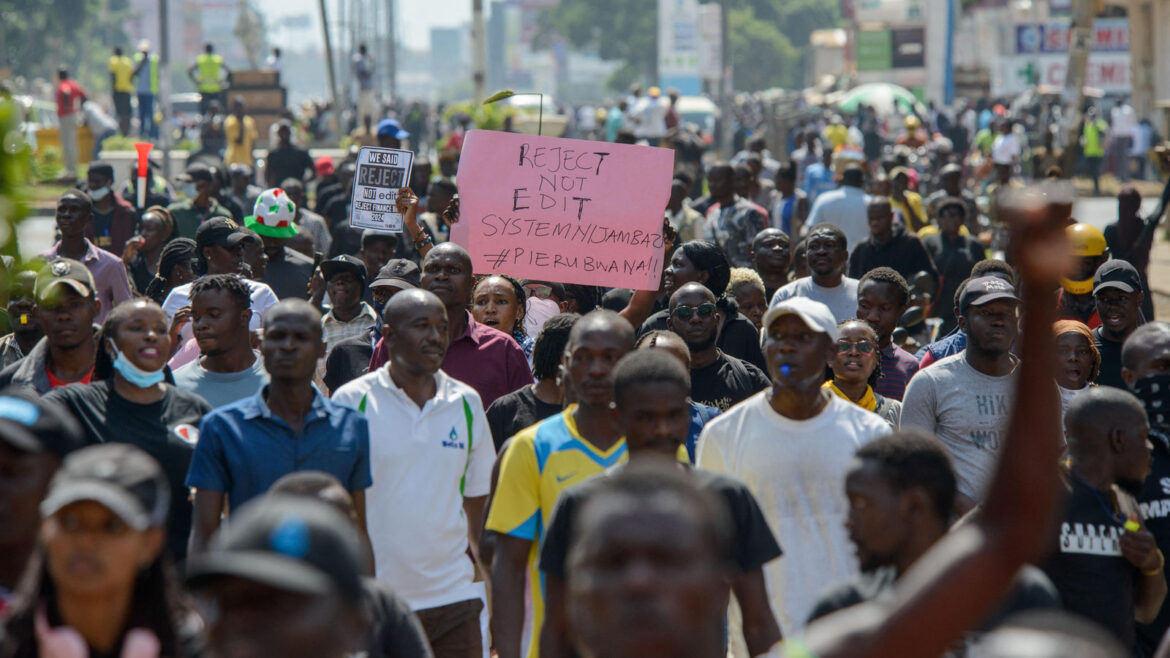As the clamor of orchestrated narratives subsides and Kenyans retreat to the sanctuaries of their unfiltered convictions, a singular truth reverberates in our collective consciousness: Kenya has plumbed the depths of degradation. The economic devastation wrought by the administrations of Uhuru Kenyatta and William Ruto has eroded our nation’s vitality, plundered our resources, and mocked the dreams of a generation. Their policies have left us staggering – skyrocketing debt, crippled industries, and a youth forced to hustle in the shadows of a system rigged against them.
Yet, as we stand in this abyss, a new force rises: young Kenyans, the indomitable heartbeat of this land, ready to sweep away the rot and forge a future ablaze with our fire, our vision, our unbreakable will.
The citizenry is acutely aware of this betrayal. No discerning mind yearns for a mere permutation of this discredited paradigm in the form of Kalonzo Musyoka, (born December 24, 1953, age 72 in 2025), Martha Karua, (born September 22, 1957, age 68), Eugene Wamalwa, (born April 1, 1967, age 58), @H
Justin Muturi, (born April 28, 1956, age 69), Fred Matiang’i, (born ~1966, age 59), Gideon Moi, (age irrelevant as a dynastic relic), or Mukhisa Kituyi, (born 1956, age 69). Add to this Rigathi Gachagua, (born February 28, 1965, age 60), whose populist theatrics mask his roots in the ossified structures of the Moi era.
These are not leaders; they are spent cartridges, recycled rejects who have outlived their usefulness, clinging to power like vultures on a dying host. Their median age is 66, a fossilized contrast to the vibrant pulse of Kenya’s youth, whose median age is 20–21. A 45-year chasm separates their withered ambitions from our boundless potential.
When we declare “Fagia Wote” – sweep them all away – let there be no ambiguity: we seek nothing less than a radical reconstitution of our governance. We reject Gachagua’s fleeting charisma and recycled rhetoric, a relic of the Moi era’s decay. Nor will we bow to foreign puppeteers – colluding with vestiges of British colonial influence to subvert our aspirations. They funnel billions to corrupt officials of the Independent Electoral & Boundaries Commission (IEBC), erecting barriers to exclude candidates unsanctioned by their elitist enclaves like Chatham House. Let them hear us: they will find our resolve unshakable. The will of the Kenyan people shall prevail, undeterred by their machinations.
We are cognizant that our audacity provokes disquiet among Western powers. Like how dare these peasants, these subjects of their erstwhile dominion presume to think for themselves? How dare we challenge the sanctity of their carefully curated sphere of influence? To those clinging to antiquated notions of hegemony, we assert unequivocally: Kenya is no longer your fiefdom. The era of acquiescence is dead.
But the greatest betrayal comes from within. These so-called leaders – Kalonzo, Karua, Wamalwa, Muturi, Matiang’i, Moi, Kituyi, Gachagua – were embraced as young men and women in the governments of Moi, Kibaki, and Kenyatta. They rode the wave of youth to power, yet now they slam the gates on us, hoarding opportunity and recycling their failed ideas. Their hypocrisy is a slap in the face of history. Below, we expose their entanglement in corruption scandals or complicity in corrupt systems, proving they are unfit to lead and why you, the youth, must take charge.
Corruption Scandals: The Old Guard’s Tainted Legacy

Spent Cartridges: Young Kenyans cannot continue being led by tone-deaf “elders”
1. Kalonzo Musyoka (Age 72)
Kalonzo has long positioned himself as a principled politician, yet his career is shadowed by allegations of complicity in corrupt systems. In 2006, as a senior opposition figure, he was implicated in a controversy when masked gunmen raided The Standard newspaper and KTN, allegedly to suppress a story about his secret meetings with President Mwai Kibaki. The raid, later revealed to be orchestrated by Kenyan police under Internal Security Minister John Michuki, raised questions about Kalonzo’s role in backroom deals that undermined press freedom. His long tenure in Kanu and subsequent alliances with corrupt regimes suggest a man more comfortable in the shadows of power than in dismantling its rot.
2. Martha Karua (Age 68)
Martha Karua has cultivated a reputation as a fierce advocate for justice, but her record is not unblemished. Her long association with Kibaki’s government (as Justice Minister until 2009) places her in proximity to major graft scandals, where billions were siphoned through fictitious contracts. No direct evidence ties her to these scandals, but her silence on systemic corruption during her tenure raises questions about her complicity. Her recent alliances with figures like Gachagua and Muturi, who are linked to questionable dealings, further erode her credibility as a transformative leader.[
3. Eugene Wamalwa (Age 58)
Wamalwa’s tenure as Defence and Agriculture Cabinet Secretary under Uhuru Kenyatta coincided with allegations of mismanagement and procurement irregularities in the military and agricultural sectors. His role in a government riddled with graft – such as the Arror and Kimwarer dams scandals – implies complicity by association. His promise of plum posts (e.g., Defence Ministry) in Raila Odinga’s failed 2022 campaign suggests a politician more focused on personal ambition than systemic reform. Wamalwa’s recycled rhetoric about “rebuilding the 2002 NARC moment” reeks of nostalgia, not innovation.
4. Justin Muturi (Age 69)
As former National Assembly Speaker, Muturi presided over a Parliament notorious for approving dubious budgets and shielding corrupt officials. His tenure saw allegations of influence peddling and favoritism in parliamentary contracts, though no direct charges were proven. His cozy relationship with Uhuru’s Jubilee government, which oversaw scandals like the NYS heist and KEMSA graft, taints his legacy. Muturi’s recent defection to opposition coalitions with Gachagua and Matiang’i suggests opportunism, not principle, as he jumps ship to stay relevant.
5. Fred Matiang’i (Age 59)
Matiang’i, as Interior Cabinet Secretary, was praised for efficiency but faced allegations of authoritarianism and misuse of state resources. He engineered the murder of hundreds of young Kenyans through the River Yala extrajudicial murders and the Covid-19 lockdown deaths by the Kenya Police. In 2020, he was linked to the controversial KEMSA scandal, where COVID-19 funds were misappropriated. His endorsement by Jubilee in 2025 and alliances with tainted figures like Uhuru Kenyatta and Rigathi Gachagua suggests a politician entangled in the same corrupt networks he claims to oppose.
6. Gideon Moi (Age Irrelevant, Dynastic Relic)
Gideon Moi, heir to Daniel arap Moi’s Kanu dynasty, embodies the rot of dynastic politics. His father’s 24-year rule was synonymous with grand corruption, including the Goldenberg scandal, where billions were looted through fake gold exports. While Gideon himself faces no direct scandal, his wealth and political influence stem from his father’s corrupt legacy, making him a symbol of unearned privilege. His quiet maneuvering in opposition coalitions shows he’s more interested in preserving dynastic power than reforming Kenya.
7. Mukhisa Kituyi (Age 69)
Kituyi, former UNCTAD Secretary-General, has avoided major personal scandals but cannot escape his ties to Kenya’s corrupt political elite. As Trade Minister under Kibaki, he served during the Anglo-Leasing scandal, and his silence on systemic graft raises questions about his commitment to reform. His recent flirtations with opposition coalitions, including Gachagua and Muturi, align him with a tainted old guard making him unfit for leadership in any capacity.
8. Rigathi Gachagua (Age 60)
Gachagua’s short tenure as Deputy President was marred by allegations of money laundering and illicit wealth acquisition. In 2021, the Ethics and Anti-Corruption Commission (EACC) investigated him for allegedly amassing KSh 5 billion in questionable wealth, including properties linked to corrupt deals. Though charges were dropped, his impeachment in 2024 cited gross misconduct and abuse of office, reinforcing perceptions of corruption. His populist rhetoric and new party launch in 2025 are desperate attempts to whitewash a tainted legacy.
The Youth’s Time Is Now

Wazee Waende Nyumbani: This time round, the youth are standing on business
Young Kenyans, you are the soul of this nation – 65% of our population under 35, a tsunami of ingenuity, courage, and hunger for justice. The old guard’s corruption scandals and complicity in broken systems prove they are unfit to lead. Their impotent ideas – repackaged failures draped in stale promises – cannot match the wildfire of your brilliance. They were embraced as young men and women in Kanu, Narc, and Jubilee, yet now they hoard power, fearing your irreverence, your digital savviness, your refusal to bow. Kalonzo’s backroom deals, Karua’s silence on Anglo-Leasing, Gachagua’s questionable billions – these are not anomalies; they are the DNA of a rotting dynasty.
You’ve built tech startups from shacks, turned art into rebellion, and organized protests that rattle the powerful. From Dandora’s hustlers to Eldoret’s farmers, from Mombasa’s poets to Nairobi’s coders, you are legions, not leaderless. You’ve seen the world through your screens, learned from global uprisings, and mastered survival in a system rigged to crush you.
You don’t need their dog-eared playbooks to govern. You can craft policies that harness AI for agriculture, transform our cities into green hubs, and make education a ladder for every child. Why wait for their blessing when you can build a Kenya where opportunity isn’t a birthright, where justice isn’t a privilege, where your hustle isn’t taxed into oblivion?
“Fagia Wote” is your covenant with destiny. Drain the miasma of systemic malaise, uproot the weeds of corruption, and plant the seeds of a Kenya that roars with self-determination. Organize across tribes – Kikuyu, Luo, Luhya, Kamba, Kalenjin, Kisii, and beyond. Reject their ethnic traps. Use your digital platforms to expose their rot, rally your peers, and amplify your voice. The ballot is your spear, the streets your battlefield, your ideas the blueprint for a reborn nation. Let the old guard retire to their villas; wazee waende nyumbani. No foreign power, no colonial hangover, no recycled politician can withstand the fury of a united youth.
This is the dawn of a new Kenya, forged by your indomitable will. The soul of our nation is yours to reclaim. Power is not given; it’s taken. Charge into the future. Take it. Now.
Young Kenyans, the dawn is yours. Fagia Wote. Unleash the fire of your generation.

